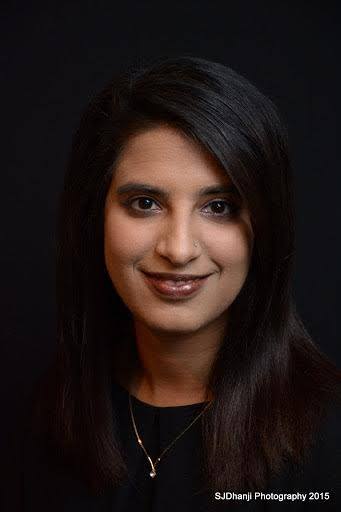Fundraising as a Choice and Not an Accident

Being a fundraiser is not only a fulfilling career that offers personal gratification, but it also serves to uplift, support, and change communities. However, for many fundraisers, their path into the field was unintentional or by accident. In this article, Danisha Bhaloo-Shivji, CFRE, member of AFP’s Women’s Impact Initiative committee, shares her untraditional start in fundraising, why it is important to present this as a viable career option early on in life and the critical need for more racialized women fundraisers in the sector.
1. What Do You Want to Be When You Grow Up?
When I was asked what I wanted to be when I grew up, I never considered fundraising to be a viable response. Until I was about 18 years old, I didn’t even realize fundraising was a full-time profession. Sure, as a child, I went door to door asking neighbors to support some causes my family was involved in, like the World Partnership Walk. And in High School, I was on the Tri-Prov Basketball Tournament Committee and had to raise some money from pop sales at the local store. But I also saw it more as a hobby and never even considered it to be a career choice.
The first time I raised a significant amount of money was volunteering for a youth justice committee in university. A group of us on the committee decided to plan and implement a gala. And that was the start of my fundraising career—as an event planner. Over the past 15 years since that first gala, I’ve worked in all aspects of fundraising—grant writing, donor stewardship, planned giving, event organizing and major gifts. But it took me being involved in the sector to even find out that fundraising was a career choice. I started in service delivery and then communications, and then I found myself asking for money … as the target of my communications.
For the past five years, I have spoken to a nonprofit management class at the University of Alberta Business School. These are graduate students who may or may not be interested in pursuing fundraising or even any career in the nonprofit sector. And that’s when I really started thinking about the fact that there are no classes in high school about fundraising, philanthropy or the charitable sector. There are no undergraduate degree programs fully dedicated to fundraising. And at the graduate level, you’re likely to find one-off optional classes on fundraising or nonprofits. While there are more opportunities today than in years past to get a masters or graduate degree/diploma in nonprofit management or philanthropy—I completed a graduate diploma from Harvard University in nonprofit management—we don’t get a chance to even think to look for those educational opportunities until well into our career.
Most of my learning opportunities have been through local AFP workshops and national conferences. All that led to achieving my CFRE designation in September 2020. But looking back, if I been exposed to this work in high school, I might have taken a more intentional and targeted route.
Fundraisers bring donors and charities together. I would argue it’s an essential service for the wellbeing of all our communities. I hope the importance of this profession continues to shine and that my daughter will know that this is a career option for her, if she chooses, early on in life and not by accident after being asked to plan an event.
2. Being a Racialized Woman in Fundraising
I feel like I’ve been pretty naïve or ignorant in the past about being a racialized woman in this profession. Or maybe I’ve just been lucky that I haven’t experienced many barriers personally due to my race.
Five years ago, I ran for municipal politics. A large part of that was fundraising, asking for donations to support my campaign. In the years that followed, I was asked if I was the target of racism. And at the time, again, being naïve or too focused on winning, I simply did not pay attention to that. Were there incidents? Yes. There was an incident post-campaign—it was a racist attack on me by one individual. Then, while I was out canvassing door-to-door, some things were said on social media. But I prioritized not listening to the “noise.”
I had to really think about if the same thing has ever happened over my 15-year career in fundraising. While not dealing with overt acts of racism, as I look back, I can tell you that I’ve hired more than a dozen people to work with me, and only one was a man (who ended up being an internal transfer from another department) and none were racialized women.
In my local AFP chapter (AFP AB, Edmonton & Area chapter), our board president is a strong, smart, racialized woman, and two other racialized women also sit on the board. Outside of fundraising, but within the nonprofit sector, I am often one of less than two racialized women who sit on nonprofit boards. And I have served on over 20 boards in the last several years.
What does this mean? Well, every organization I am part of is committed to diversity and inclusion. I have no qualms that there are good intentions at play from the leadership at these organizations. The issue may be that, similar to me growing up, racialized women may not see a career in fundraising as an option. We need to do a better job of recruiting women, and racialized women, into the field at an early age. When girls my age are told to be doctors or lawyers, fundraisers should be right there as a top choice. This involves a culture shift, but also a societal shift, on placing value on the work being done by fundraisers, allowing them the flexibilities, pay, and balance that other sectors allow its workers.
Maybe then the question to me won’t be what barriers I faced as a racialized woman in my career, but rather, how much money did I raise for the upliftment of my community?
Do You Want to Share Your Story?
If you are a woman who identifies as Black, Indigenous, or person of color and would like to share your story with Danisha about what motivated you to choose a career in fundraising and what makes you stay in this profession, please reach out to Taryn Gold at taryn.gold@afpglobal.org. Video interviews will be conducted over the next several weeks and will be shared on all AFP platforms.


 Danisha Bhaloo-Shivji, CFRE, is the development and communications manager with Boys & Girls Clubs Big Brothers Big Sisters of Edmonton. In a volunteer capacity, Danisha is the chairperson of the Social Wellbeing Advisory Committee for the City of Calgary, a board member with United Way Centraide Canada and on the Leader's Cabinet for United Way Calgary. She is a member of the Women's Impact Initiative for the Association of Fundraising Professionals and is a board member for the Calgary John Howard Society. Some of her past activities include being a senator for the University of Alberta, a candidate for the Ward 12 Edmonton City Council By-Election in 2016, local chairperson and national member of the Aga Khan Youth and Sports Board of Canada, vice-chair of the Edmonton John Howard Society, World Partnership Walk Deputy Convenor of Marketing, and a board member for the Edmonton Opera. Danisha has been recognized for her contributions to the community by Future of Good as one of their 21 Young Impact Leaders, the Government of Alberta Stars of Alberta Award, University of Alberta Alumni Award, Avenue Magazine Edmonton’s Top 40 under 40, Edmontonians' Magazine’s Sizzling 20 under 30, and Correctional Services of Canada. Danisha currently resides in Calgary with her husband and daughter. Connect with her on social media: Twitter: @danishabhaloo | Linkedin:
Danisha Bhaloo-Shivji, CFRE, is the development and communications manager with Boys & Girls Clubs Big Brothers Big Sisters of Edmonton. In a volunteer capacity, Danisha is the chairperson of the Social Wellbeing Advisory Committee for the City of Calgary, a board member with United Way Centraide Canada and on the Leader's Cabinet for United Way Calgary. She is a member of the Women's Impact Initiative for the Association of Fundraising Professionals and is a board member for the Calgary John Howard Society. Some of her past activities include being a senator for the University of Alberta, a candidate for the Ward 12 Edmonton City Council By-Election in 2016, local chairperson and national member of the Aga Khan Youth and Sports Board of Canada, vice-chair of the Edmonton John Howard Society, World Partnership Walk Deputy Convenor of Marketing, and a board member for the Edmonton Opera. Danisha has been recognized for her contributions to the community by Future of Good as one of their 21 Young Impact Leaders, the Government of Alberta Stars of Alberta Award, University of Alberta Alumni Award, Avenue Magazine Edmonton’s Top 40 under 40, Edmontonians' Magazine’s Sizzling 20 under 30, and Correctional Services of Canada. Danisha currently resides in Calgary with her husband and daughter. Connect with her on social media: Twitter: @danishabhaloo | Linkedin: 

